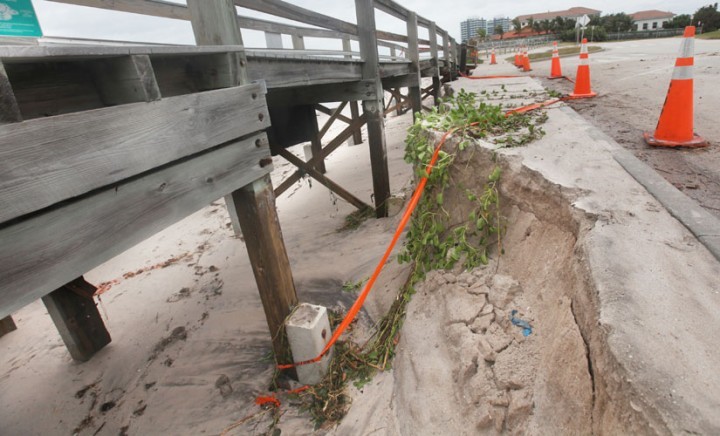VERO BEACH — Two-and-a-half miles of critically eroded shoreline in Central Beach that threatens hotels, restaurants, private homes and the Conn Beach boardwalk will not be repaired or protected for at least four years, according to sources at the city, county and state.
“That is an area of concern,” says Indian River County Coastal Engineer James Gray of the stretch between the northern city limit and the Riomar golf course. “There are structures in that area that may be subjected to damage in a storm.”
In a sharp disagreement over who should be funding the needed beach repair, city officials point to the county, noting that the area in generates a majority of county tourism tax revenue, but county officials say no money is available for sand placement in Central Beach at this time.
The narrow beaches at Jaycee Park, Sexton Plaza and Humiston Park that are the county’s most popular tourist attractions were classified as critically eroded by the Florida Department of Environmental Protection in 2008.
The designation means there is danger to “upland development, recreation, wildlife habitat, or important cultural resources,” all of which are at risk on the island.
City officials say the beaches have continued to erode in the years since they were identified as critical, especially during Hurricane Sandy when 10-foot waves pounded the shoreline for several days.
“I am very concerned about future storm damage in that area,” says Vero Beach City Councilmember Tracy Carroll. “The beaches are not a third of what they were a year ago.”
Known as Sector 5 in the county’s Beach Preservation Plan, the Central Beach shoreline was slated for repair in 2011 at a cost of $6.6 million. The county planned to place more than 200,000 cubic yards of sand to widen the beaches and restore protective dunes that would break the force of storm waves and keep buildings from being washed away.
But the beach replenishment program got bogged down on the north island in 2009, in an area known as Sector 3, when the county commission voted to abandon the time-tested method of pumping offshore sand onto eroded beaches and decided to mine inland sand and spread that instead.
Subsequent to the decision, the 6.6-mile Sector 3 repair job, which would likely have been done in a few months with offshore sand, ended up taking three years and costing twice as much as expected, $15 million in all, for sand purchase, placement and monitoring.
By the time the project finally wrapped up last summer, the 2011 timeframe for fixing Sector 5 was out the window and state money that had helped pay for earlier beach replenishment had dried up.
Now Gray says Sector 5 repair has been put off until 2017 at the earliest, while the county updates its Beach Preservation Plan and seeks permits from state and federal agencies.
“We just selected a consultant to update the plan. They will study conditions along the entire county coastline to identify erosion trends and prioritize areas for repair. They should have that done toward the end of this year. After that, it will probably take a year or a year and a half to finalize and approve the plan.”
Once the consultant, Coastal Planning and Engineering, Inc., identifies the areas most in need of repair, the county will move ahead with plans for its next beach replenishment project if money is available.
If the revised plan continues to identify Sector 5 as the most critically eroded area, Gray says it will take at least two additional years after plan completion to get needed permits from DEP and the Army Corps of Engineers before work can begin.
“We haven’t started any feasibility or design work on sector five,” he says.
The county has $6 million in its beach repair fund but Budget Director Jason Brown says the money is committed elsewhere.
“There are identified projects that will require the likely use of most of these funds,” he wrote in an e-mail to sister publication Vero Beach 32963.
The bulk of the $6 million is being held in reserve to provide required matching funds for a $4.8-million appropriation state Rep. Debbie Mayfield and State Sen. Joe Negron are hoping to get passed in the current legislative session to repair damage done to county beaches by Hurricane Sandy.
If the state money comes through, the combined $9.6 million in sand replenishment funds won’t help Central Beach, according to Gray.
“As I understand it, the state money is specified to fix damage in sector three, because it is considered an engineered beach we have already invested in.”
The city can’t replenish its own beaches because its charter prohibits the use of tax money for that purpose except in emergencies.
The charter allows for a referendum in which voters could approve the use of tax dollars for beach repair, but Councilmember Dick Winger says the point is moot because the city does not have the money to replenish its vanishing beaches.
Vero City Manager Jim O’Connor says the city does not have a plan B to fix the beaches if the county does not step up.
“We are very concerned [about storm damage at the critically eroded beaches] and the county should be as well since majority of the tourism tax is collected in that area.”
“I don’t think we are being treated fairly,” says Winger.

